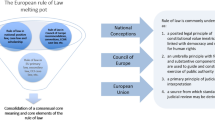Abstract
After the collapse of communism countries of Central-Eastern Europe amended their constitutions and declared law-governed state as form of regimes. 27 years after collapse of communisms there is huge problem with rule of law. Formally is function but practice does not confirm it. The paper try to explain this phenomenon using theory of two transformations; visible and hidden one.
Similar content being viewed by others
Notes
Zdzisław Krasnodębski, ‘Postkomunizm – życie po życiu’ [Post-communism – life after life], Rzeczpospolita, 8 May 2004.
Rychard (2002), pp. 147–171.
Łoś and Zybertowicz (2000).
See for instance Staniszkis and Rich (1999).
See the examples regarding the privatisation law in Poland Kosikowski, n. 4, p. 41.
See Zajadło (2001).
Unfortunately we do not have data on how many judges or practitioners from the broad legal professions were collaborators with the secret services. It is largely due to the luck of the consequent lustration. Paradoxically, now in 2016 there is a return to the discourse on the necessity of a clean judiciary. In my opinion it is now too late.
See the article ‘Ustawa za lapowke czyli przychodzi Rywin do Michnika’ [The statute for bribes or Rywin pays a visit to Miichnik], http://wyborcza.pl/1,75478,1237212.html?disableRedirects=true. Accessed 8 March 2016.
For an historical overview of phenomena of clientelism see Mączak (1994).
See the very insightful paper by A. Zybertowicz, Anty Rozwojowe Grupy Interesow. Zarys analizy [Anti-developmental interests group. Outline of the analysis], presented to the Polish Sociological Association Annual Conference, Poznan 2004 (on file).
Sajó (2003), p. 171.
Borucka-Arctowa 2003.
References
Borucka-Arctowa M, Palecki K (eds) (2003) Sądy w opinii społeczeństwa polskiego. Kraków
Czarnota A, Krygier M, Sadurski W (eds) (2005) Rethinking the rule of law after communism. Central European University Press, Budapest
Hausner J, Marody M (eds) (2000) Jakość rządzenia: Polska bliżej Unii Europejskiej? [The quality of governing. Poland closer to the Europan Union?]. Fundacja im. Fridricha Eberta-malopolska Szkola Administracji Publicznej Akademii Ekonomicznej w Krakowie, Kraków
Jarosz M (2004) Władza, przywileje, korupcja [Power, privilige, corruption]. Wydawnictwo Naukowe PWN, Warsaw
Kosikowski C (2003) Prawne aspekty prywatyzacji w Polsce [Legal aspects of privatisation in Poland]. In: Jarosz M (ed) Pułapki prywatyzacji [Traps of privatisation]. Instytut Studiow Politycznych PAN, Warsaw, p 41
Krasnodębski Z (2003) Demokracja peryferii [Peripheral democracy]. Gdansk
Łoś M, Zybertowicz A (2000) Privatisation of the police state. Palgrave Macmillan, The Case of Poland
Mączak A (1994) Klientela. Nieformalny system władzy w Polsce i w Europie XVI-XVIII w. [Clintelism. Informal systems of power in Poland and Europe from the XVIth to the XVIIIth century]. Semper, Warsaw
Mariański J (ed) (2002) Kondycja moralna społeczeństwa polskiego [The moral condition of Polish society]. Wydawnictwo WAM, Kraków
Mokrzycki E, Rychard A, Zybertowicz A (eds) (2002) Utracona dynamika? O niedojrzałości polskiej demokracji [Lost dynamism? On the immaturity of the Polish democracy]. IFiS PAN, Warsaw
Rychard A (2002) Polityka i społeczeństwo w Polsce: ewolucja porządku instytucjonalnego [Politics and society in Poland: evolution of the institutional order]. In: Mokrzycki E, Rychard A, Zybertowicz A (eds) Utracona dynamika? O niedojrzałości polskiej demokracji [Lost dynamism? On the immaturity of the Polish democracy]. IFiS PAN, Warsaw, pp 147–171
Sadurski W, Czarnota A, Krygier M (2005) Spreading democracy and the rule of law? The impact of EU enlargement for the rule of law. Democracy and constitutionalism in post-communist legal orders. Springer, New York
Sajó A (2003) From corruption to extortion: conceptualization of post-communist corruption. Crime Law Soc Change 40:171
Staniszkis J (2001) Postkomunizm. Próba opisu [Postcommunism. An attempt to describe description]. slowo/obraz terytoria, Gdańsk
Staniszkis J, Rich V (1999) Post-communism: emerging enigma. Jadwiga Institute of Political Studies, Polish Academy of Sciences, Warsaw
Wedel JR (2001) Collision and collusion. The strange case of western aid to Eastern Europe, Palgrave
Wincenty D (2002) Transformacja, prywatyzacja i czołowi aktorzy [Transformation, privatisation and the main actors]. Studia Polityczne 13:351–356
Zajadło J (2001) Formuła Radbrucha. Filozofia prawa na granicy pozytywizmu prawniczego [Radbruch’s folmula. Philosophy of law on the border on legal positivism]. Arche, Gdańsk
Zybertowicz A (1993) W uścisku tajnych służb: upadek komunizmu i układ postnomenklaturowy [In the hug of the secret services: the collapse of communism and the post-nomenclatura system]. Antyk, Komorów
Zybertowicz A (2002) Demokracja jako fasada: przypadek III R.P [Democracy as façade. The third Polish republic case]. In: Mokrzycki E, Ruchard A, Zybertowicz A (eds) Utracona dynamika. O niedojrzalosci polskiej demokracji (Lost dynamics. On immaturity of Polish democracy). Wydawnictwio IFiS PAN, Warszawa, pp 173–216
Author information
Authors and Affiliations
Corresponding author
Rights and permissions
About this article
Cite this article
Czarnota, A. Rule of Law as an Outcome of Crisis. Hague J Rule Law 8, 311–321 (2016). https://doi.org/10.1007/s40803-016-0039-5
Published:
Issue Date:
DOI: https://doi.org/10.1007/s40803-016-0039-5



